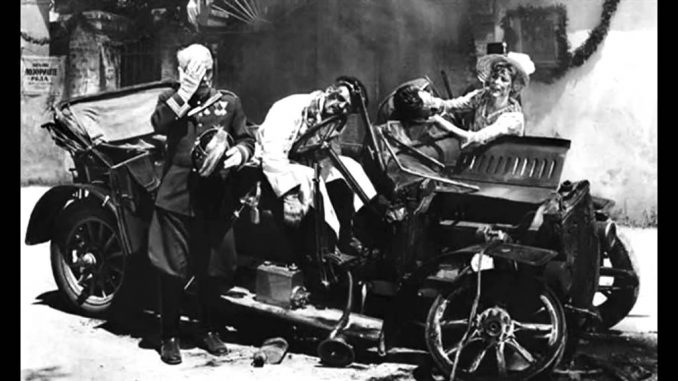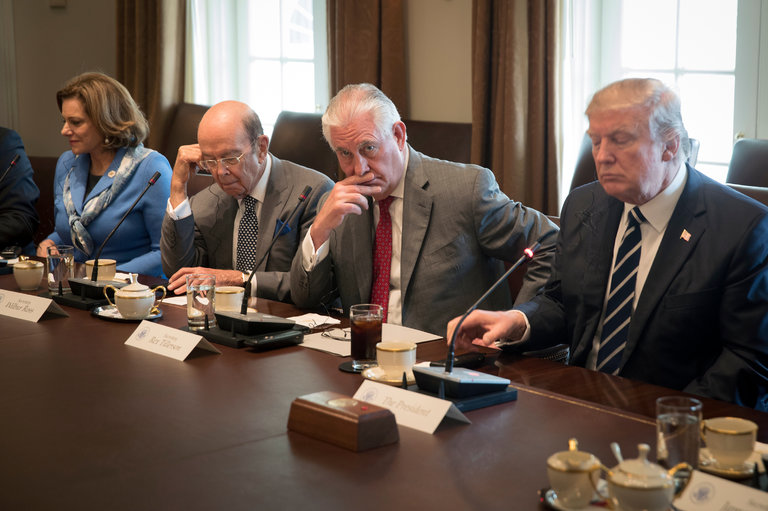
Tillerson & Trump [ TNT] inhabit a dangerous fantasy world in general —but especially re what China realistically can and can’t do re North Korea. If US indeed threatens Xi with a region-wide co-ordinated anti-missile system, there is NO WAY the PRC will EVER agree — EVER. Any such US threat will empower and legitimize the wing of Chinese elite that WANTS to “unleash” Kim Jong-un. Top, assassination of archduke Franz Ferdinand, the “spark” that exploded into war the kind of rigidity and tensions we have today. Bottom, barely recognizable Tillerson during meeting w Egyptian president at White House Monday. After North Korea’s latest missile launch, Tillerson said in bizarre statement: “The United States has spoken enough about North Korea. We have no further comment.”
“When North Korea launched a medium-range missile on Tuesday evening,
Secretary of State Rex Tillerson issued a statement so cryptic that it left much of Washington [ and the rest of the world ] confused.
“North Korea launched yet another intermediate-range ballistic missile,” it began.
“The United States has spoken enough about North Korea.
We have no further comment.”
In fact, the Trump administration has said very little about North Korea,
apart from some Twitter posts and Tillerson’s own statements in Seoul, South Korea, two weeks ago —
when he said the US would negotiate with North Korea only after it gave up its nuclear weapons and missiles.
And that is unlikely to happen.
A comprehensive policy review, ahead of the visit of China’s president, Xi Jinping, to the US this week, came to an unsurprising conclusion:
The administration would greatly intensify economic and military pressure on the North for the foreseeable future,
and assure the Chinese that, once that pressure was in place, it would consider “engaging” the North Koreans.
That is, the US would negotiate with them, presumably before they have given up their nuclear weapons and missiles, despite Tillerson’s earlier statements.
Tillerson has made clear he will be a secretary of few words, preferring to do his deals behind closed doors and open himself to as little probing of the strategy as possible.
But in the absence of much public comment, US allies are confused about the administration’s strategy of coercive diplomacy.
It is unclear whether the goal is to force the North Koreans to surrender their arsenal, as Tillerson suggested,
or just freeze missile and nuclear tests and open a negotiation.
[It’s unclear because these morons HAVE NO IDEA of what to do — neither their end-game NOR a realistic way to achieve that. ]
And many of those allies wonder how increasing pressure is likely to succeed when directed against a country
that has survived financial cutoffs, trade sanctions and the presence of surrounding military forces for more than six decades.
The tactics appear to have strong similarities to past efforts.
In the 1994 nuclear crisis with North Korea, which former Secretary of Defense William J. Perry later called
the closest the two countries have come to war since the 1953 armistice that ended the Korean War,
President Bill Clinton built up the American military presence in the South.
President George W. Bush closed down transactions at a bank in Macau where Kim Jong-il, the predecessor and father of the current North Korean leader, kept his money.
He reluctantly ended those sanctions under pressure from the South Korean government.
President Barack Obama periodically flew B-2 stealth bombers to South Korea, as a reminder that America’s nuclear weapons could easily reach Pyongyang.
Each of those administrations tried to use economic and military pressure to start negotiations.
Clinton was the most successful, but even that won only a few years’ respite,
as the North secretly began a nuclear enrichment program that was revealed during the Bush administration.
A deal the Bush administration struck in its final year fell apart early in the Obama years.
Tillerson has not explained how the strategy he and Trump plan to present to the Chinese will be substantially different.
[ Repeat :
Tillerson has not explained how the strategy he and Trump plan to present to the Chinese will be substantially different. ]
After Tillerson declared in Seoul two weeks ago that the era of “strategic patience” was over,
Jeffrey Lewis, a nonproliferation expert at the Middlebury Institute of International Studies in Monterey, wrote in The Washington Post:
“Someone forgot to tell him that a new administration promising a new approach it can’t quite articulate is, in fact, the old approach”.
“Previous administrations even used the same words, calling North Korea’s actions ‘unacceptable’ and pointing to a different ‘path.’”
At the heart of the talks on Thursday and Friday at Mar-a-Lago will be an effort to get the Chinese to step up their pressure.
It will not be the first time:
At various points, the Chinese have signed on to United Nations Security Council resolutions imposing sanctions,
and the State Department — under Tillerson’s predecessors — has said the North would be more isolated than ever.
As Robert S. Litwak, the director of international security studies at the Woodrow Wilson International Center for Scholars, said recently,
“The conundrum is that North Korea never acts except under pressure, but pressure never works.”
The [ alleged ] subtext of Tillerson’s comment that “the US has spoken enough about North Korea” is that action will speak louder than words.
In the conversation with Xi, Trump is expected to describe a military buildup that, unless China cuts off the North,
could include significantly more missile defense in the Pacific — which the Chinese believe is secretly directed at them.
But there is no reason to believe that the Chinese will press the North so hard that the viability of the Kim dynasty is threatened.”
Tillerson and Trump are living in a dangerous fantasy world in general —
but especially re the structural constraints on China’s influence over North Korea.
If they indeed make that kind of threat towards the Chinese — a region-wide co-ordinated anti-missile system —
then there is NO WAY the PRC will EVER agree — EVER …
Indeed, any such threat by the US will empower and legitimize the wing of the Chinese elite that WANTS to “unleash” Kim Jong-un —
